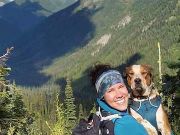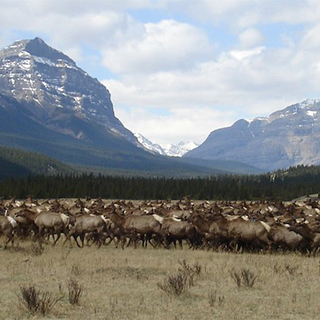Lab Members
-

Mark Hebblewhite, Professor
Born in Montreal and raised in Ontario by British parents awed by Canada's wilderness, my childhood love of wildlife was kickstarted into a career by a lucky park ranger job in Hudson Bay when I was 18. I've conducted research on wildlife from songbirds to bears, focusing on wolves and their ungulate prey across Canada, the US, eastern Europe and Mongolia. My main research objectives are to always combine strong empirical approaches to the conservation of terrestrial wildlife and the systems in which they live. To me, large ungulates and their predators are good entry points to understanding ecosystems because of their important roles and their conservation and management relevance. I love running, mountain biking, hiking and walks with my wife Emily, children Anna and Simon and our dog, Koda, a poorly trained Husky.
mark.hebblewhite@umontana.edu | Google Scholar Profile | Hebblewhite CV
-

Benjamin Larue, Postdoc
Benjamin grew up in Québec where he spent much time wandering in the large expanses of deciduous and boreal forests which kindled his passion for wildlife conservation and ecology. He graduated with a Ph.D. in Biology from Université de Sherbrooke with a thesis focused on bighorn sheep evolutionary ecology. Interested in researching conservation solutions which integrate both ecological integrity and human well-being, Benjamin joined the Hebblewhite lab as a postdoctoral fellow in May 2023. Specifically, he will use advances in statistical tools to better understand barren ground caribou movement patterns and demography for the “Fate of the Caribou” project. His research will thus hopefully benefit both caribou conservation and the cultural integrity of the Indigenous communities who depend on and have cohabited with caribou for millennia. Outside of work, Benjamin enjoys connecting to nature through rock climbing, surfing, skiing, hiking, birding and camping.
-

Brenna Cassidy, PhD student
Brenna is from northern Illinois where her curiosity for the natural world grew in the forests and tall grass prairies. She completed a degree in wildlife ecology at the University of Wisconsin-Stevens Point and spent summers during her undergrad in northern Wisconsin or Yellowstone National Park. After graduating in 2012, she returned to Yellowstone and worked on projects studying wolves, birds and cougars. She started at University of Montana in 2018. Her PhD research examines the ecological and evolutionary drivers of lifetime reproductive success of gray wolves in Yellowstone. Outside work, she can usually be found trail running, skiing, mountain biking or in the pottery studio.
-

Tara Meyer, PhD student
Tara’s interests in science drove her to study ecology as an undergraduate at Colgate University, and afterwards, technician positions observing African elephants in Tanzania and grey wolves in Wyoming. In 2015 Tara earned her MESc from the Yale School of the Environment, examining snow leopards in western Tajikistan. After Yale, Tara supervised the region 5 wildlife conflict and private lands programs with the Washington Department of Fish and Wildlife, and then amplified conservation impacts with the Wildlife Conservation Network. She was named an Emerging Wildlife Conservation Leader in 2017, and during her two-year fellowship she contributed research towards monitoring Grauer's gorillas in the DRC. For her PhD, Tara is examining the effects of climate changes on top-down and bottom-up drivers of elk migration, parturition, and survival in the Canadian Rockies (part of the Ya Ha Tinda Long-Term Elk Monitoring Project). Tara spends her free time exploring the outdoors and traveling with her husband David and their two children.
-

Connor Meyer, PhD student
Connor grew up in western Washington where he gained an appreciation for the outdoors by exploring the Cascade Mountains and spending time on the water in Puget Sound. After graduating from the University of Washington with a degree in wildlife conservation, he found his way onto the Yellowstone Wolf and Cougar Projects. After five years in Yellowstone Nationa Park, Connor joined the Hebblewhite Lab for his PhD and migrates north to the Ya Ha Tinda Long-Term Elk Monitoring Project. He is interested in understanding the intrinsic and extrinsic factors influencing an individual’s decision to switch migration tactics, including predation risk, forage quality and the previous year’s reproductive success. When not working, Connor can be found attempting to stave off injury while running, hiking, biking and skiing.
Connor's website: https://connorjmeyer.weebly.com/
-

Jonathan Farr, MS Student
Jonathan was born in a small town at the edge of the Canadian Rockies in Alberta, Canada, and has always felt rooted to gravel bed rivers, wildflower-covered ridgelines, and shale slopes. Between semesters of his undergrad in Ecology at the University of Alberta, Jonathan landed a job as a park interpreter at Elk Island National Park. This led to working as a field technician in Banff National Park for several summers where he spent time whacking weeds, scoping out bighorn sheep, and finding feces from a variety of ungulates. Jonathan started his MSc at the University of Montana in 2022 and is studying the trophic ecology of Banff’s recently reintroduced Plains bison to understand how they may affect Banff’s bighorn sheep and the Ya Ha Tinda elk population. Constantly seeking the elusive balance between work and life, Jonathan enjoys volleyball, Nordic skiing, canoeing, and playing piano.
-

Read Barbee, MS Student
Originally from Austin, Texas, Read has always been passionate about wildlife and the outdoors. He got his start in wildlife research assisting with a wide variety of bird projects as an undergraduate at Cornell University. He later worked as a summer research assistant studying snow leopards with Panthera and the Snow Leopard Conservancy India Trust in Ladakh, north India. After graduating, he joined Panthera's Olympic Cougar Project in western Washington where he worked for two years as a field technician. His master's work is focused on understanding mountain lion habitat selection and connectivity on the Olympic Peninsula and working with six local First Nations and the Washington Department of Transportation to identify locations for new wildlife crossing structures along the I-5 highway corridor.
-

Sarah Straughan, Research Associate
Sarah received her B.S. in Wildlife Biology from Texas State University, where she worked removing invasive aquatic plants and restoring endemic Texas Wild Rice in the beautiful San Marcos River. After her work in aquatic restoration, she moved on to studying life history evolution of songbirds - searching for nests in Arizona, South Africa, and Borneo. During the COVID-19 pandemic she took a brief hiatus from the field of ecology, where she worked for the Missoula County Health Department to manage and report covid data. Sarah joined the Hebblewhite lab in December of 2022 and helps to coordinate research activities, manage grants, and work with data across Heb Lab projects. Both in and out of work Sarah loves learning new things and her hobbies range from mountain biking and climbing to pottery and adventuring through the realms of D&D.
-

Birch Gano, Ya Ha Tinda Lead Field Biologist
Birch was born and raised in rural Alberta on a cattle ranch. She completed her undergraduate in biology at the University of Victoria. Birch has worked with species at risk including swift foxes, greater sage grouse, and Vancouver Island marmots. Birch’s interest in ungulate ecology, predator-prey relationships, and love for the field led her back to the Canadian Rockies where she now works as the lead field biologist on the Ya Ha Tinda Long-term Elk Monitoring project. Birch enjoys skiing, horseback riding, joining in on her friends hunting trips, or planning her next overseas adventure.
